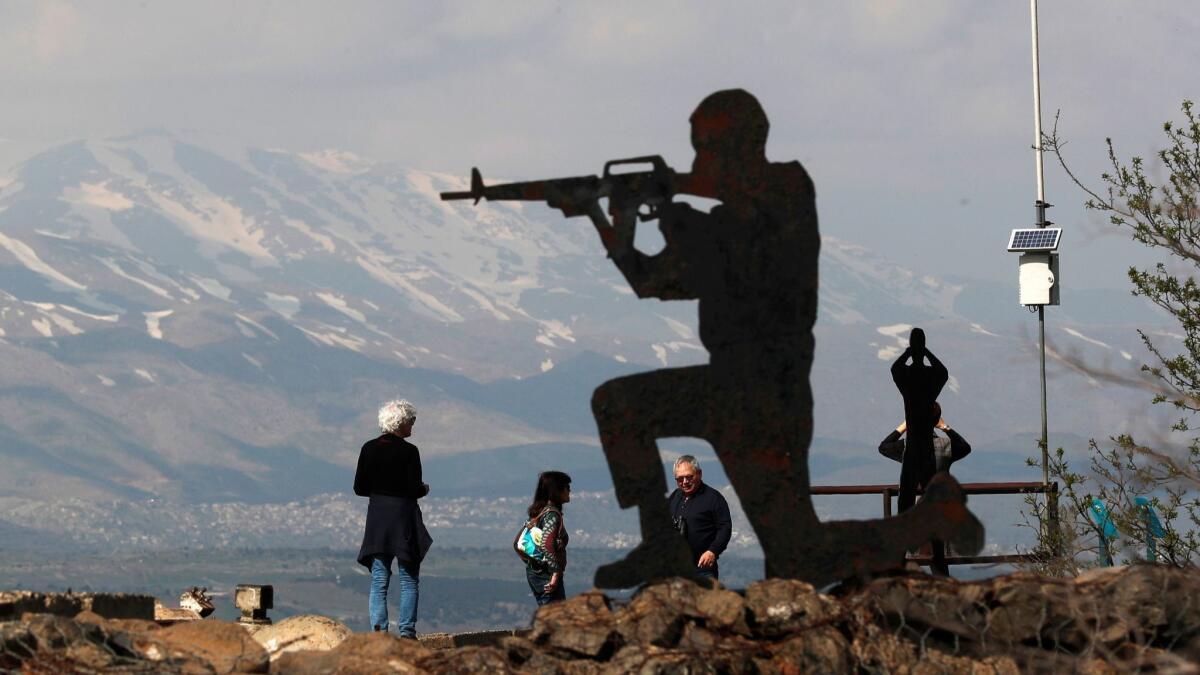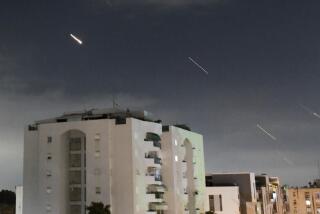Trump’s Golan Heights tweet inflames regional tensions as Syria vows to recover the occupied land

Syria and its Russian and Iranian allies on Friday slammed President Trump’s call to recognize Israeli sovereignty over the Israeli-occupied Golan Heights, inflaming regional tensions at a time when the Trump administration is seeking to curtail Iran’s expanding influence.
A statement by the Syrian Foreign Ministry said the move would increase the country’s determination to recover the territory occupied by Israel “by all available means,” and Russia and Iran said it violated international law.
Turkey, a U.S. ally, said it risked creating a new Middle East crisis.
Trump’s push to assert Israel’s ownership of the strategic heights along the Syrian-Israeli border, conveyed in a tweet on Thursday, marked a major shift in U.S. policy and has been welcomed by Israeli Prime Minister Benjamin Netanyahu. But it also raised concerns that confrontations along the cease-fire line could escalate.
Israel seized two-thirds of the Golan during the 1967 war, and since 1973 Syria has made no military effort to regain it. Its army is no match for Israel’s superior military capabilities.
In the 1990s and later in the late 2000s, Damascus engaged in peace talks with Israel, backed by the United States, to secure the return of the territory.
The Syrian civil war, however, has brought Iranian military advisors and Iranian-backed militias such as Lebanon’s Hezbollah into the part of the Golan Heights that remains under Syrian control, and they have on a number of occasions fired rockets into Israel, triggering retaliatory strikes.
Syria called the assertion of Israeli sovereignty “irresponsible,” saying it revealed the U.S. “mentality of hegemony and arrogance.”
“The statements of the American president and his administration … will never change the fact that the Golan was and will remain part of Arab Syria and that the Syrian people are more resolute and determined to liberate this precious patch of Syrian national territory by all available means,” the Foreign Ministry statement said.
Iranian Foreign Ministry spokesman Bahram Qasemi said Trump’s assertion was “illegal and unacceptable” and does not change the fact that the Golan “belongs to Syria.” The Russian Foreign Ministry said it violated United Nations resolutions that call for the restoration of the territory to Syria.
The U.S. assertion of Israeli claims will give Iran a propaganda boost at a time when the Trump administration is pressing allies in the region to join efforts to roll back Iranian influence. Secretary of State Michael R. Pompeo arrived in Beirut on Friday on a visit aimed at urging Lebanese leaders to take action to limit Hezbollah’s growing prominence in the Lebanese government.
His message may be blunted, however, by the fury over Trump’s Golan tweet, which has also raised fears of a similar U.S. shift on the status of the Palestinian territories.
Announcing the U.S. policy shift on the eve of the Lebanon visit “will backfire,” according to Hilal Khashan, professor of political science at the American University of Beirut. Most ordinary Lebanese, including those who are opposed to Hezbollah, are outraged by the recognition of Israeli sovereignty over land they see as Arab, he said.
“This measure will boost Hezbollah by justifying its military presence on the Golan and giving it an excuse for continued expansion,” he said. “Hezbollah will benefit by telling everyone: ‘Our pledge to maintain our military arsenal is justified, the war is not over.’ And it will weaken those who would like to see Hezbollah eventually disarmed.”
Turkish President Recep Tayyip Erdogan warned in a speech in Istanbul that Trump’s “unfortunate remarks” recognizing Israeli sovereignty risked pushing the region toward “a new crisis.”
“We cannot allow the legitimization of the occupation of the Golan Heights,” he said.
Liz Sly is a reporter for the Washington Post
More to Read
Start your day right
Sign up for Essential California for news, features and recommendations from the L.A. Times and beyond in your inbox six days a week.
You may occasionally receive promotional content from the Los Angeles Times.






